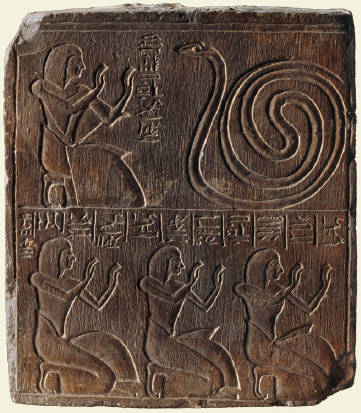PORTRAIT Paneb, An Egyptian Criminal
The life of Paneb (ca. thirteenth century B.C.E.) illuminates an underside of Egyptian life rather different from the images of order and harmony portrayed in much of ancient Egyptian art and literature.22 Paneb was born into a family and a village of tomb workers—people who quarried, sculpted, and painted the final resting places of the pharaohs at a time when royal pyramids were no longer being constructed. Granted generous allowances of grain, beer, fish, vegetables, firewood, and clothing, tomb workers represented a prestigious occupation in ancient Egypt.
Paneb was apparently orphaned as a youngster and raised by another tomb-working family, that of the childless Neferhotep, a foreman of the tomb workers’ crew who brought his adopted son into the profession. But Paneb quarreled violently with Neferhotep, on one occasion smashing the door to his house and threatening to kill him.

As an adult, Paneb married and sired a large family of eight or nine children. He also indulged in numerous affairs with married women and was involved in at least one rape. One of his lovers was the wife of a man with whom Paneb had grown up in Neferhotep’s home; the couple subsequently divorced, a frequent occurrence in ancient Egypt. In another case, Paneb seduced both a married woman and her daughter and shared the sexual favors of the daughter with his son Aapehty. It is not difficult to imagine the tensions that such behavior created in a small close-knit village.
When Paneb’s adoptive father Neferhotep died—he was perhaps murdered—Paneb succeeded him as workplace foreman, thus incurring the lifelong hostility of Neferhotep’s brother, Amennakht, who felt he had better claim to the job. What turned the tide in Paneb’s favor was his “gift” of five servants, made to the vizier, the pharaoh’s highest official, who was responsible for such appointments. To add insult to Amennakht’s injury, those servants had belonged to Neferhotep himself.
While such bribes were common practice in obtaining promotions, it was Paneb’s use of his position as foreman of the tomb workers’ crew that got him into ever deeper trouble. He actively harassed his rival Amennakht, preventing him and his family from using the small chapel in which workers celebrated the festivals of their gods. He quarreled with the foreman of another work crew saying: “I’ll attack you on the mountain and I’ll kill you.” Such angry outbursts led to frequent fighting and gained Paneb a reputation for brutality.
Paneb also exploited his position as foreman to his own advantage. He used—or stole—expensive tools given to the work crew for his own purposes. He ordered members of his work crew to do personal work for him—making a bed which he then sold to a high official, feeding his oxen, weaving baskets for his personal use, and preparing and decorating his own tomb, using materials pilfered from the royal tombs he was charged with constructing. On one occasion he stole the covering of a royal chariot and another time he entered a royal tomb, drank the wine intended for the pharaoh’s afterlife, and in an act of enormous disrespect . . . even blasphemy . . . actually sat on the sarcophagus containing the embalmed body of the ruler.
Although rebuked from time to time by high officials, Paneb’s bad behavior continued. “He could not stop his clamor,” according to an official document. At some point, Paneb’s son publicly denounced his father’s sexual escapades. But the final straw that broke his career came from Amennakht, Paneb’s long-time rival. He apparently had had enough and drew up a long list of particulars detailing Paneb’s crimes. That document, from which our knowledge of Paneb largely derives, has survived. It concluded in this fashion:
He is thus not worthy of this position. For truly, he seems well, [but] he is like a crazy person. And he kills people to prevent them from carrying out a mission of the Pharaoh. See, I wish to convey knowledge of his condition to the vizier.
The outcome of this complaint is unclear, for Paneb subsequently disappears from the historical record, and a new foreman was appointed in his place. It was not, however, Amennakht.
Question
Since most of the evidence against Paneb comes from his archrival, how much weight should historians grant to that account? How might the story appear if written from Paneb’s viewpoint? What perspectives on the Egypt of his time does Paneb’s career disclose? How do those perspectives differ from more conventional and perhaps idealized understandings?